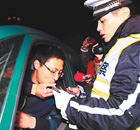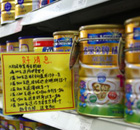Science and Health
Knowledge of health not people's wealth
By Lan Tian (China Daily)
Updated: 2009-12-19 11:54
 |
Large Medium Small |
Chinese are definitely not the most health-literate people in the world, with just seven out of 100 having the basic knowledge about the subject, according to a nationwide official survey.
"The research objectively and truthfully reflects the health literacy of urban and rural residents in China," Mao Qun'an, health education center director of the Ministry of Health (MOH), said on Friday.
It is a call to the authorities and citizens to take measures to change the situation, he told a press conference while releasing the survey.
About 80,000 people aged between 69 and 15 were covered by country's first nationwide survey on health awareness.
The study defines health literacy as an individual's ability to get, understand and use health information in order to improve his/her health. Only respondents who correctly answered 80 percent or more of the 71 questions were considered health literates.
The questions were related to basic public health such as how to read the pulse and temperature of a person, or the right way to measure obesity and overweight, and only 6.48 percent of the respondents could answer 56 or more of the questions correctly.
People aged between 69 and 65 had the lowest health literacy, 3.81 percent, followed by those aged between 55 and 64, 4.69 percent.
Measures have to be taken to increase their health awareness, he said.
More urban residents, however, are health literate (9.94 percent) than their rural counterparts (3.43 percent).
Surprisingly, more than 80 percent of the respondents could not answer the questions: "What diseases can mosquitoes, flies, rats or cockroaches transmit?" and "How to help a person who has broken a bone?"
Low health literacy level is a threat to better public health, said Chang Chun, a professor of health education with the school of public health in Peking University.
"The inability to obtain, comprehend or put into action the most basic health knowledge will prevent people from taking care of their own health or to lead a healthier life," she said.
"If people can monitor their blood pressure changes, they can protect themselves against high blood pressure and other chronic diseases," said Yang Qing, director of the MOH's department of women and children's healthcare and community hygiene.
The survey's questions were drafted by more than 100 experts, he said. And if people know their answers and put them into practice they can help build a healthier society.










